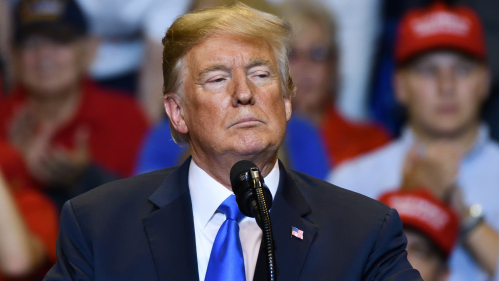News of Donald Trump’s indictment by a New York grand jury for his role in covering up hush money paid to adult film actress Stormy Daniels sent shock waves across the country Thursday. Trump will likely turn himself in and face arraignment next week, marking the first time a president has faced criminal charges.
David Greenberg, a professor of history and journalism and media studies and an expert on American political and cultural history, talked to Rutgers Today about the implications of Trump’s indictment and what it could mean for his support among Republicans.
A former president has never been indicted before. Do you think this marks a permanent shift for what legal jeopardy a president can face, and what does this mean?
Indicting Trump was the proper thing to do. But I worry that it could open the door to retaliation. In our polarized political environment, it is very hard to establish consensus on a question like a president’s or former president’s legal culpability. To take a lesser example, Democrats may have had a good case in voting to keep the right-wing congresswoman Marjorie Taylor Greene off her assigned committees. But when Republicans took back the House, they retaliated – with less justification – against Democratic Congress members Adam Schiff, (the lead prosecutor in Trump's first impeachment), Eric Swalwell (who served as a manager of Trump’s second impeachment trial) and Minnesota's Ilhan Omar, barring them from committees. So, there is a danger this will lower the bar toward going after a former president, and we don’t want to end up like a banana republic where former presidents are routinely jailed.
Are there any comparisons you can draw from history that shed light on how this can or should proceed?
The obvious comparison is Nixon. He was, famously, an “unindicted co-conspirator” in Watergate. Prosecutors were considering indicting him when his successor, Gerald Ford, pardoned him. At the time, most of America was outraged. Later, there was reconsideration, with the recognition that Nixon’s forced resignation was itself a form of punishment (as well as, of course, a way to prevent him from abusing power). These days, in light of Trump, historians are reconsidering the reconsideration. Maybe Nixon should have gone to jail.
Some Trump allies say this actually helps him win support and boosts his chances of a successful 2024 presidential run. Do you think that’s true and do you think this will be a distraction that makes it impossible to focus on the issues?
It is true that in the past, attacks on Trump have often only intensified the loyalty of his base. On the other hand, between 2016 and 2020 enough Trump voters became disillusioned with him that they voted for Biden. Biden won because a significant number of people in conservative-leaning states like Wisconsin, Georgia and Arizona changed their minds. So, one can guess that some people will, as a result of this, change their minds about whether they want Trump to lead their party. But we can’t predict the future.
Critics say the charges in New York are flimsy and could actually hurt the odds of getting an indictment for election meddling in Georgia, a much more serious charge. What do you think?
There are serious questions about the strength of the New York case. Does paying hush money really amount to an illegal campaign contribution? On the other hand, I don’t see why it should affect the Georgia case. That is handled separately, without regard to what’s happening in the Manhattan DA’s office.
Why are issues like this no longer disqualifying for a politician? Why do Trump’s supporters stick by him?
It has always been the case that voters forgive a great deal of misbehavior if they like a politician’s politics. This is true for Democrats as much as Republicans. Ted Kennedy was one of the greatest senators in the history of the institution. He also drove a woman off a bridge after he’d been drinking and failed to save her. His reputation suffered but Democrats continued to support him because he represented their values and was effective in the Senate. (I voted for him happily.) One could come up with a long list of politicians on both sides of the aisle who’ve weathered scandals because they were popular with their voters.
One thing that has changed has been the nature of media coverage. With the rise of partisan media, online media and amateur news outlets, politicians no longer face a seemingly unanimous call from media voices for them to resign or withdraw from political life. It is easier for them to have confidence that their base will stay with them.
Sometimes this is good. When Virginia governor Ralph Northam was discovered to have a picture of someone in blackface in his medical school yearbook, media commentators and the political class immediately demanded he resign. But voters – including Black voters – wanted him to stay in office. He did, and in retrospect that was the right call. So, there is something to be said for listening to actual voters rather than to the hubbub that arises at the start of a scandal. On the other hand, it is not good when immoral, dangerous or destructive political actors get a free pass to remain in or to return to power.



